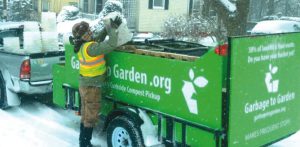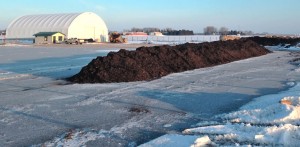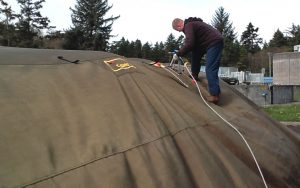BioCycle April 2013, Vol. 54, No. 4, p. 12
Portland, Maine: “Garbage To Garden” Food Waste Collection
What started as not having enough space to compost at home led to a new business venture to collect food scraps from households in the City of Portland and about a half-dozen surrounding communities. Garbage To Garden was started by Tyler Frank and Sable Sanborn in August 2012. After eight months, the company is servicing about 800 households that pay $11/month for the collection service. “We added 100 households in the dead of winter,” notes Frank. In Portland and some of the other communities, residents pay by the bag for garbage collection (about $1.50/bag), creating an incentive to divert the organics.
Garbage To Garden provides 6-gallon buckets, which are collected weekly. Customers can choose between receiving a clean bucket in exchange, or one filled with compost. “We will give back thousands of pounds per year of finished compost, but most people just want to recycle their food waste,” says Frank. “We accept all food scraps, including meat, dairy and bones, as well as leaves and brush. We also will give customers a separate container for fats and oils, which we recycle with Maine Standard Biofuels in Portland. Our collection truck runs on their biodiesel. Maine Standard also makes industrial strength liquid soaps using waste glycerin generated by biodiesel production. We use the soap to wash out the 6-gallon buckets.”
Garbage To Garden also offers food waste collection to small businesses and restaurants, but the residential sector is by far the largest customer base. The truck used for bucket collection also pulls a trailer that can hold about 12 cubic yards of food waste. The organics are taken to Benson Farm in Gorham, which has a composting site to process manure and shellfish waste. “The Farm is about 15 minutes outside of our collection route,” adds Frank. Prior to starting Garbage To Garden, he worked in various trades, utilizing his degree in business. “I grew up composting, and when we had the idea for the food waste collection service, we decided to pursue the opportunity. We don’t put money toward advertising, so our growth has been primarily by word of mouth. We make food scraps recycling accessible to everyone.”
Seattle, Washington: City Council Approves SSO Contract
The Seattle City Council unanimously approved a contract on April 1 to send its yard trimmings, food waste and biosolids to two separate entities. According to a news report in the Daily Record, the $4 million-a-year contract with Lenz Enterprises and PacifiClean LLC would send 40 percent of Seattle’s organics to the Lenz Enterprises’ composting facility near Stanwood, Washington, and 60 percent to an as-yet undetermined location in Kittitas County to be operated by PacifiClean. The Council’s vote was delayed a week after hearing concerns from residents in Kittasas County. A recent BioCycle profile of PacifiClean’s project (see “Integrated Organics Management In Central Washington,” March 2013) discussed PacifiClean’s planned composting and anaerobic digestion facility near Elk Heights, Washington, in Kittitas County. In the approved contract, PacifiClean has agreed to select a different site that is outside of the Mountains To Sound Greenway and is surrounded by compatible industrial uses and a minimum number of homes.
The city of Seattle’s compost contracts with Cedar Grove Composting Inc. are scheduled to expire March 31, 2014. The new contract approved on April 1, which would be effective for at least six years, would start April 1, 2014. According to the Daily Record, until PacifiClean’s plant is built, the Seattle Council directed Seattle Public Utilities to provide quarterly written reports with information about the new composting site, permitting, public involvement and environmental outreach.
Good Thunder, Minnesota: Food Residuals Composting Underway
Prior to starting Full Circle Organics, LLC in 2011, Max Milinkovich worked for a waste company in the Twin Cities region of Minnesota. One of his responsibilities was finding processing sites for source separated organics (SSO). The lack of options inspired Milinkovich to leave his job and start Full Circle Organics. And in January 2013, its first composting facility opened in Farley, Iowa, followed in February by a new site in Good Thunder. “The mission of Full Circle Organics is to successfully manage a multilocation cooperative of composting facilities,” explains Milinkovich. “A third facility is scheduled to open in Becker, Minnesota this fall.” The Good Thunder site received a Solid Waste Compost Facility permit from the Minnesota Pollution Control Agency, making it the first privately owned and operated MSW composting facility in the state. The facility is permitted to manage industrial and preconsumer SSO, and can receive 110 tons/day of source separated food waste, and an unlimited volume of yard trimmings.
Bethesda, Maryland: USCC Model Compost Rule Template
The United States Composting Council (USCC) released its Model Compost Rule Template, developed by a Task Force comprised of state regulatory officials, composting facility operators and consulting engineers. “The Model Rule Template will assist state regulatory agencies in development and/or revision of their composting regulations,” says Michael Virga, USCC Executive Director. “Model composting rules, based on science as well as experience, are needed as a foundation for operators and regulators to help in the permitting process and aid in regulatory oversight.”
Rapidly growing interest in creating programs to recycle food residuals streams generated by grocers, restaurants, food service providers, food manufacturers and households has created demand for composting facilities to receive and process those materials. A key component of the USCC’s Model Compost Rule Template (MCRT) is a tiered regulatory approach intended to facilitate permitting and oversight of composting operations processing source separated organics, including food residuals — while ensuring operations produce high quality compost and are protective of public health and the environment.
The MCRT has eight sections: Definitions; Feedstock Categories; Exemptions; Tiers One, Two and Three (each a separate section); Criteria for Siting A Composting Facility; and Compost Testing. Three feedstock categories were created: Type 1 includes yard trimmings, wood materials, crop residues; Type 2 includes agricultural residuals (including manure), source separated organics and state agency-approved food processing residuals and industrial by-products; Type 3 includes mixed solid waste, municipal biosolids, diapers and industrial by-products and food processing residuals not included in Type 2.
The Tier One regulatory category covers Type 1 feedstocks; Tier Two covers Types 1 and 2, and Tier 3 includes all feedstock types. Composting facilities in all three tiers are required to meet the time and temperature requirements according to the Process to Further Reduce Pathogens (USEPA, Part 503, 40CFR). Overall, the goal of the USCC and its Task Force was to develop a Model Rule that is not prescriptive, i.e., it does not spell out actual design and operational requirements.
The USCC’s Model Compost Rule Template can be downloaded at: http://compostingcouncil.org/advocacy-resource-materials/.
Florence, Oregon: Biosolids Composting Replaces Landfill Disposal
Biosolids composting is underway at the City of Florence Wastewater Treatment Plant (WWTP). The city received a $100,000 Lane County Waste Diversion Opportunity Grant to proceed with Phase 1 implementation of its biosolids composting facility, which is using the Gore® Cover technology supplied by Sustainable Generation LLC, the U.S. authorized sales and service provider. The immediate economic impact is elimination of landfill disposal costs as well as the expense of transporting 250 tons/year of biosolids over 70 miles one-way through the mountains to the landfill. This initiative also provides a solution to the City of Florence’s yard waste burn ban. The biosolids and yard trimmings, also originally requiring landfill disposal, are now being combined to produce 600 cubic yards/year of Class A compost for use in municipal projects and the public under the Flo Grow label.
Burlington, Vermont: Campus Offices Tap Bike-Powered Food Scraps Collection Service
The state of Vermont mandated “universal recycling of solid waste” with passage of Act 148 in June 2012, including required organics recycling for all municipalities by 2020. Although this new legislation has put some institutions under the gun to figure out how they will collect organics, others are getting a jump-start on their composting programs. The University of Vermont (UVM) has been diverting food waste from its dining halls since 1997, composting about nine tons/week, but no program was in place for administrative buildings. Because office buildings are spread throughout UVM’s 410-acre campus, collecting smaller amounts of organics was more challenging. “Chasing banana peels with a truck” was not feasible from an environmental or labor efficiency standpoint, notes Erica Spiegel, UVM’s Recycling and Solid Waste Manager.
Enter onto the scene One Revolution LLC, a member-owned bicycle-powered delivery and advertising service that has been operating in the Burlington region since 2010, but had more recently added residential organics collection to its list of services. One Revolution LLC teamed up with UVM Recycling as well as the student Bike Users Group (B.U.G.) at the university to design a pilot organics recycling pickup program for 16 offices that responded to a composting survey sent to all staff and faculty. The pilot started in May 2012. “In August, we surveyed participants and found the program successful,” says Spiegel. “We agreed to expand the collection service to 25 additional offices in October 2012. There are now about 45 office locations, which is a good number in terms of pedal time and weight capacity of the bike trailer.”
Each office is given small cellulose-lined “Bag-To-Earth” compostable bags to use in their kitchenette. Full bags are picked up twice a week by a One Revolution bike rider using a pull-behind trailer, which can haul up to 300 pounds at a time. About 150 lbs/week of organics are collected. The bags are cycled to the university’s student center and combined with dining hall organics. All materials are hauled via a contractor to the Green Mountain Compost facility about 6 miles away in Williston. For more information, contact One Revolution LLC, onerevolutionvt@gmail.com, or Erica Spiegel, erica.spiegel@uvm.edu.
Ventura, California: Growing The Feedstock Flow
In April 2012, Harrison Industries, a Ventura-based trash and recycling hauler, joined forces with Agromin, an organics recycler based in Oxnard, to launch a pilot food waste collection program. In less than a year, Harrison trucks have collected more than 700 tons of food residuals from restaurants, grocery stores, schools and other businesses with Agromin turning the feedstocks into compost. Albertsons supermarkets in Ventura, Camarillo and Carpinteria were the first commercial customers to join the program. Food scraps are placed in specially marked recycling barrels that Harrison trucks collect and deliver to Agromin. The company employs a covered aerated static pile system to compost the food waste and yard trimmings. In the past year, Harrison’s organics collection program has grown to over 30 commercial accounts that include restaurants, supermarkets, hospitals, hotels, schools and a correctional facility.













